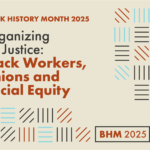
“We must open the doors and we must see to it they remain open, so that others can pass through.”
— Rosemary Brown
International Women’s Day (IWD) has its roots in women’s struggles for labour rights and universal suffrage: it originated in 1909 in honour of the previous year’s New York garment workers’ strike.
Today, with women making up almost half of Canada’s workforce, and a new government who has identified gender parity and the advancement of women’s rights as a priority, it is time to reflect on the challenges still facing women in Canada and get to work on dismantling fundamental barriers to true equality.
While women are well represented in the workforce and in post-secondary education, they also make up a significant majority of part-time and precarious workers, and are over-represented in undervalued and low-wage sectors of employment. Women with disabilities, Indigenous women and racialized women face additional barriers and challenges, including lower wages and higher unemployment.
Advancing women’s rights in Canada means addressing the disproportionate barriers facing the most vulnerable groups of women, and putting in place programs and services that address the systemic roots of discrimination and inequality. It means looking beyond gender parity as a goal and striving for equity.
As Rosemary Brown once said, “We must open the doors and we must see to it they remain open, so that others can pass through.”
Canada’s lack of a universal system of comprehensive, high-quality early childhood education and child care remains one of the most significant barriers to the advancement of women’s rights and economic empowerment.
In order to participate in the workforce, many women and their families need a safe place for kids to play, learn and grow. It opens the doors to employment, education and advancement. Yet, only one in five kids under five has access to a regulated space, and child care fees exceed the cost of university tuition in most Canadian cities.
Over the past few months, the federal government started working with provinces and territories to develop a National Early Learning and Child Care Framework. The Canadian Labour Congress (CLC) urges all levels of governments to use, as a basis for their negotiations, the Shared Framework developed by Canada’s major child care organizations and their allies, and endorsed by the CLC.
Governments should approach their discussions with a commitment to building child care systems, and set out common policy frameworks based on key principles – recognizing in particular that child care is a human right and public good, not a commodity. Most of all, governments must commit to a plan for long term, sustained child care funding.
The upcoming federal budget can send a strong signal by making immediate, modest investments in child care, including dedicated transfers to provinces and territories for specific initiatives to address affordability, develop the child care workforce and/or meet the needs of hard-to-serve populations, such as those working non-standard hours, rural communities, families with infants, families with children with disabilities, or refugee and newcomer families.
In addition, the federal government should establish funding for Indigenous communities to design, deliver and govern services that meet their needs and aspirations, consistent with related recommendations from the Truth and Reconciliation Commission.
Everyone depends on someone who depends on child care. On this IWD, let’s open doors, and urge governments to work together to building a universal child care system that will help women enter and stay in the workforce, educate and train for better jobs.
To learn more about the Shared Framework, visit: http://ccaac.ca/2015/01/20/advocacy-initiatives-and-policy-developments/





